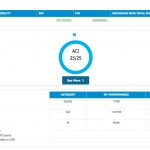The most recent Merit-Based Incentive Payment System (MIPS) reporting season included a new option for rheumatology providers for the first time since the MIPS program launched in 2017: the Advancing Rheumatology Patient Care MIPS Value Pathway (MVP). The MVP was developed to provide a specialty-specific reporting pathway focused on the measures and activities most relevant to rheumatology providers and patient care across all four reporting categories—quality, improvement activities, promoting interoperability and cost—while still providing a streamlined Quality Payment Program (QPP) reporting experience.
The introduction of the new MVP options reflects the move by the Centers for Medicare & Medicaid Services (CMS) toward value-based payment programs. The MVP shares many elements with the traditional MIPS, such as the performance categories, but differs in key points that aim to reduce provider burden. For example, it requires reporting of a lower number of quality measures from a more condensed catalog than traditional MIPS.
“When the rheumatology MVP was first developed, we worked closely with the CMS to fill in the structure with pieces most relevant to our rheumatology providers, especially for quality measures,” says Tracy Johansson, MS, senior director of the ACR’s RISE registry. “The ACR’s quality measures are developed by rheumatology professionals with their workflows and everyday experiences in mind. And given those measures are available through the ACR’s RISE registry, all the data needed to calculate those measures are pulled directly from the electronic health record [EHR] systems of participating practices, making reporting and performing well that much easier.”
To better understand providers’ 2023 MVP reporting experience, the RISE registry sent a comprehensive survey to all practices that reported for the Advancing Rheumatology Patient Care MVP through RISE. This survey captured information on the reporting process, levels of customer support satisfaction and reporting intentions for 2024. Of the 22 practices that used the MVP reporting option through RISE for 2023, nine completed the survey, a 41% response rate. Here are the main findings:
Finding 1: The Process Wasn’t New
Survey respondents unanimously indicated the reporting process for the MVP was nearly identical to that for the traditional MIPS—for better or worse.
“Reporting for MIPS or reporting for MVP is almost the same process,” says Carol Rendon, office manager of the Denver Arthritis Clinic. “The process is just stressful!”
“Reporting for MIPS is by no means a simple process,” says Ms. Johansson. For practices that choose to report only the MVP, the smaller number of required quality measures reduces some of the administrative burden, but the reporting requirements for the other categories remain the same, she notes. “The good news is those who have reported for MIPS in the past will recognize the reporting process and be able to navigate it better, and of course RISE staff are available to help answer any questions that may come up.”


